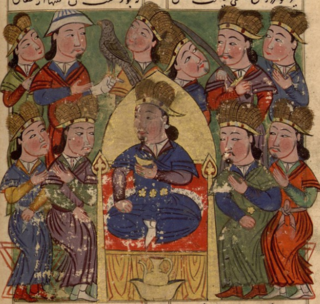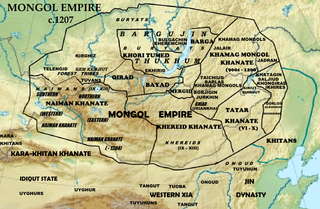Bolad (alternatively spelled Pulad, Pulat, Polat , or Polad in Persian and Turkic languages) is common given name among the Inner Asian peoples. The meaning of the word Bolad is "steel". In Khalkha Mongolian form of the word is Bold.
Notable people with the name include:

Mongolian is the official language of Mongolia and both the most widely spoken and best-known member of the Mongolic language family. The number of speakers across all its dialects may be 6.2 million, including the vast majority of the residents of Mongolia and many of the ethnic Mongol residents of the Inner Mongolia Autonomous Region of the People's Republic of China. In Mongolia, Khalkha Mongolian is predominant, and is currently written in both Cyrillic and the traditional Mongolian script. In Inner Mongolia, it is dialectally more diverse and written in the traditional Mongolian script. However, Mongols in both countries often use the Latin script for convenience on the Internet.

The Mongolic languages are a language family spoken by the Mongolic peoples in Eastern Europe, Central Asia, North Asia and East Asia, mostly in Mongolia and surrounding areas and in Kalmykia and Buryatia. The best-known member of this language family, Mongolian, is the primary language of most of the residents of Mongolia and the Mongol residents of Inner Mongolia, with an estimated 5.7+ million speakers.
Kurultai was a political and military council of ancient Mongol and Turkic chiefs and khans. The root of the word is Proto-Mongolic *kura-, *kurija- "to collect, to gather" from which is formed khural meaning "meeting" or "assembly" in Turkic and Mongolian languages. Khuraldai, khuruldai or khuraldaan means "gathering" or, more literally, "intergatheration". From this same root arises the Mongolian word хурим, which means "feast" and originally referred to large festive gatherings on the steppe but is used mainly in the sense of "wedding" in modern times.

Biligtü Khan, born Ayushiridara, also known by his temple name as the Emperor Zhaozong of Northern Yuan, was an emperor of the Northern Yuan dynasty, reigning from 1370 to 1378. He ascended to the throne after the death of his father Toghon Temür. In 1372, he defeated an invading Ming dynasty army and recaptured some regions that were previously lost to the newly founded Ming dynasty.
Tarkhan is an ancient Central Asian title used by various Turkic, Hungarian, Mongolic, and even Iranian peoples. Its use was common among the successors of the Mongol Empire and Turkic Khaganate.

The Khalkha or Kalka have been the largest subgroup of Mongol people in modern Mongolia since the 15th century. The Khalkha, together with Chahars, Ordos and Tumed, were directly ruled by Borjigin khans until the 20th century; unlike the Oirats, who were ruled by Dzungar nobles or the Khorchins, who were ruled by Qasar's descendants.
Bold most commonly refers to:
Köke Temür, sinicized name Wang Baobao, was a prominent general of the Yuan dynasty of China.
Baghatur is a historical Turkic and Mongol honorific title, in origin a term for "hero" or "valiant warrior". The Papal envoy Plano Carpini compared the title with the equivalent of European Knighthood.

Gaykhatu was the fifth Ilkhanate ruler in Iran. He reigned from 1291 to 1295. His Buddhist baghshi gave him the Tibetan name Rinchindorj which appeared on his paper money.
Mongolian names have undergone a number of changes in the history of Mongolia, both with regard to their meaning and their source languages. In Inner Mongolia, naming customs are now similar to Mongolia but with some differences.
Ötüken was the capital of the First Turkic Khaganate and Uyghur Khaganate. It has an important place in Turkic mythology and Tengrism. Otukan (Ötüken) is also one of the names given to Mother Earth. Otuken is located in Kharkhorin district in Övörkhangai Province of present-day Mongolia.
Bolad, was an ethnic Mongol minister of the Yuan dynasty of China, and later served in the Ilkhanate as the representative of the Great Khan of the Mongol Empire and cultural adviser to the Ilkhans. He also provided valuable information to Rashid-al-Din Hamadani to write about the Mongols. Mongolists consider him a cultural bridge between East and West. He was ennobled by Emperor Renzong of Yuan as Duke of Ze (澤國公) in 1311 and Prince of Yongfeng (永豐郡王) in 1313, posthumously.

Khamag Mongol was a loose Mongolic tribal confederation (khanlig) on the Mongolian Plateau in the 12th century. It is sometimes considered to be a predecessor state to the Mongol Empire.
Bold is a surname. Notable people with the name include:
Altan is a male Turkish given name used also as first name and a Mongolian given name. Altan means "golden" in Mongolian and "red dawn" in Turkic. The related word "Altın" is also Turkish for "golden" and a common Turkish first name.
Altın is a Turkish word meaning "golden". It is also a common surname. Notable people with the surname include:
Beyk Pulad is a village in Baghleq Rural District of the Central District of Raz and Jargalan County, North Khorasan province, Iran.
Pulad-e Qasemi is a village in Band-e Zarak Rural District, in the Central District of Minab County, Hormozgan Province, Iran. At the 2006 census, its population was 1,392, in 261 families.
Bold is a Mongolian name, and Boldyn is the patronymic of Bold. Notable people with the name include: